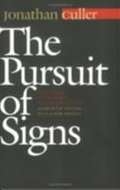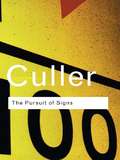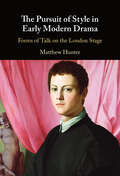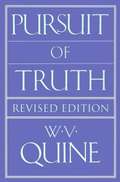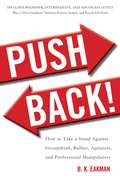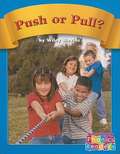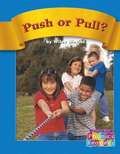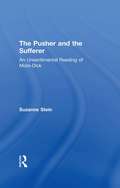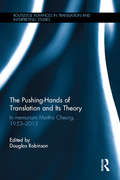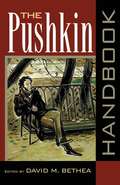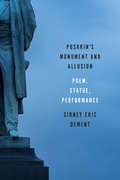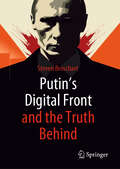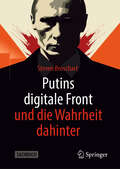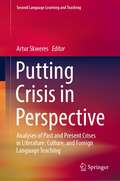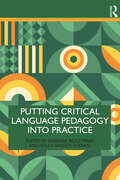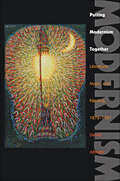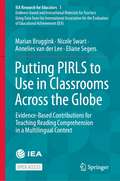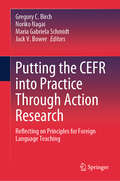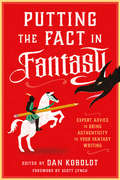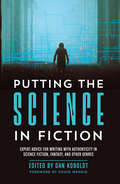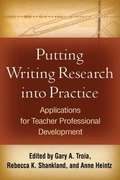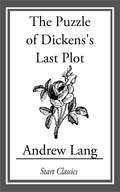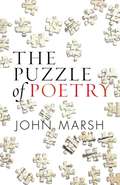- Table View
- List View
The Pursuit of Signs: Semiotics, Literature, Deconstruction
by Jonathan CullerThe primary task of literary theory, Jonathan Culler asserts in the new edition of his classic in this field, is not to illuminate individual literary works but to explain the system of literary signification-the rules and conventions that determine a reader's understanding of a text and that make literary communication possible. In this wide-ranging book, he investigates the possibilities of a semiotics of literature. A new preface places The Pursuit of Signs in the context of major developments in the study of literature since publication of the original Cornell edition in 1981.
The Pursuit of Signs: Semiotics, Literature, Deconstruction (Routledge Classics)
by Jonathan CullerTo gain a deeper understanding of the literary movement that has dominated recent Anglo-American literary criticism, The Pursuit of Signs is a must. In a world increasingly mediated, it offers insights into our ways of consuming texts that are both brilliant and bold. Dancing through semiotics, reader-response criticism, the value of the apostrophe and much more, Jonathan Culler opens up for every reader the closed world of literary criticism. Its impact on first publication, in 1981, was immense; now, as Mieke Bal notes, 'the book has the same urgency and acuity that it had then', though today it has even wider implications: 'with the interdisciplinary turn taking hold, literary theory itself, through this book, becomes a much more widespread tool for cultural analysis'.
The Pursuit of Style in Early Modern Drama: Forms of Talk on the London Stage
by Matthew HunterThe Pursuit of Style in Early Modern Drama examines how early modern plays celebrated the power of different styles of talk to create dynamic forms of public address. Across the sixteenth and seventeenth centuries, London expanded into an uncomfortably public city where everyone was a stranger to everyone else. The relentless anonymity of urban life spurred dreams of its opposite: of being a somebody rather than a nobody, of being the object of public attention rather than its subject. Drama gave life to this fantasy. Presented by strangers and to strangers, early modern plays codified different styles of talk as different forms of public sociability. Then, as now, to speak of style was to speak of a fantasy of public address. Offering fresh insight for scholars of literature and drama, Matthew Hunter reveals how this fantasy – which still holds us in its thrall – played out on the early modern stage.
Pursuit Of Truth
by W. V. QuineIn Pursuit of Truth W. V. Quine gives us his latest word on issues to which he has devoted many years. As he says in the preface: "In these pages I have undertaken to update, sum up, and clarify my variously intersecting views on cognitive meaning, objective reference, and the grounds of knowledge?'The pursuit of truth is a quest that links observation, theory, and the world. Various faulty efforts to forge such links have led to much intellectual confusion. Quine's efforts to get beyond the confusion begin by rejecting the very idea of binding together word and thing, rejecting the focus on the isolated word. For him, observation sentences and theoretical sentences are the alpha and omega ofthe scientific enterprise. Notions like "idea" and "meaning" are vague, but a sentence-now there's something you can sink your teeth into. <p><p> Starting thus with sentences, Quine sketches an epistemological setting for the pursuit of truth. He proceeds to show how reification and reference contribute to the elaborate structure that can indeed relate science to its sensory evidence.In this book Quine both summarizes and moves ahead. Rich, lively chapters dissect his major concerns-evidence, reference, meaning, intension, and truth. "Some points;' he writes, "have become clearer in my mind in the eight years since Theories and Things. Some that were already clear in my mind have become clearer on paper. And there are some that have meanwhile undergone substantive change for the better." This is a key book for understanding the effort that a major philosopher has made a large part of his life's work: to naturalize epistemology in the twentieth century. The book is concise and elegantly written, as one would expect, and does not assume the reader's previous acquaintance with Quine's writings. Throughout, it is marked by Quine's wit and economy of style.
Push Back!: How to Take a Stand Against Groupthink, Bullies, Agitators, and Professional Manipulators
by B. K. EakmanHow many times have you had the unsettling experience of being treated as a troublemaker as soon as you question or raise an objection to a school policy, a textbook, a course of study, a new county regulation, or a community proposal?Every day, attendees of conferences, community forums, PTA meetings, and board meetings are made to feel uncomfortable and occasionally foolish by the person or persons leading the meeting. The speakers, moderators, or provocateurs-whom author B. K. Eakman refers to as professional manipulators-hold power over the room and know how to steer the discussion back to their agendas without ever answering audience questions or addressing their concerns. These people use techniques to ostracize those brave enough to stand and question or criticize them.With Push Back!, readers will be able to counter group manipulation tactics by learning to:Recognize psychologically controlled environmentsIdentify the professional agitator/provocateurExamine components of psych warUndercut faulty, distorted, and biased arguments of opponentsSquelch techniques used to rebuff audience members who complain or balkNeutralize consensus-building techniquesAnd much more
Push or Pull?
by Wiley BlevinsPhonics Readers is a recognized leader in helping you teach phonics and phonemic awareness, within the context of content-area reading. Content area focus: Pushes or Pulls Phonics Skills: long u (u_e, ew), inflectional ending -ed
Push Or Pull?
by Wiley BlevinsDiscusses forces such as push or pull in an easy-to-read text that incorporates phonics instruction and rebuses.
The Pusher and the Sufferer: An Unsentimental Reading of "Moby Dick" (Studies in Major Literary Authors #2)
by Suzanne SteinFirst Published in 2000. Routledge is an imprint of Taylor & Francis, an informa company.
The Pushing-Hands of Translation and its Theory: In memoriam Martha Cheung, 1953-2013 (Routledge Advances in Translation and Interpreting Studies)
by Douglas RobinsonThis book presents an East-West dialogue of leading translation scholars responding to and developing Martha Cheung’s "pushing-hands" method of translation studies. Pushing-hands was an idea Martha began exploring in the last four years of her life, and only had time to publish at article length in 2012. The concept of pushing-hands suggests a promising line of inquiry into the problem of conflict in translation. Pushing-hands opens a new vista for translation scholars to understand and explain how to develop an awareness of non-confrontational, alternative ways to handle translation problems or problems related to translation activities that are likely to give rise to tension and conflict. The book is a timely contribution to celebrate Martha's work and also to move the conversation forward. Despite being somewhat tentative and experimental, it probes into how to enable and develop dynamic interaction between and reciprocal determinism of different hands involved in the process of translation.
Pushing the Boundaries of Latin American Testimony
by Louise Detwiler Janis BreckenridgeRevealing twenty-first century contexts, ground-breaking scenarios, and innovative mediums for this highly contested life writing genre, this volume showcases a new generation of testimonio scholarship.
The Pushkin Handbook
by David M. Bethea"The Pushkin Handbook," a collection of studies by leading Pushkin scholars from the former Soviet Union, North America, and elsewhere, unites in one volume a multiplicity of voices engaged in a genuinely post-Soviet dialogue. From its beginnings, Pushkin's oeuvre has accommodated numerous, often competing readings. This book is further testimony to the continuing complexity of Russia's preeminent writer: his place in the literary and cultural cosmos, his relationship to his Russian predecessors and contemporaries, and his reception and interpretation at various points in history.
Pushkin’s Monument and Allusion: Poem, Statue, Performance
by Sidney Eric DementIn August of 1836 Alexander Pushkin wrote a poem now popularly known simply as "Monument." He died a few months later in January of 1837. In the decades following his death, the poem "Monument" was transformed into a statue in central Moscow: the Pushkin Monument. At its dedication in 1880, the interaction between the verbal text and the visual monument established a creative dynamic that subsequent generations of artists and thinkers amplified through the use of allusion, the aesthetic device by which writers reference select elements of cultural history to enrich the meaning of their new creation and invite their reader into the shared experience of a tradition. The history of the Pushkin Monument reveals how allusive practice becomes more complex over time. By the twentieth century, both writers and readers negotiated increasingly complex allusions not only to Pushkin’s poem, but to its statuesque form in Moscow and the many performances that took place around it. As the population of newly literate Russians grew throughout the twentieth century, images of the future poet and the naive reader became crucial signifiers of the most meaningful allusions to the Pushkin Monument. Because of this, the story of Pushkin’s Monument is also the story of cultural memory and the aesthetic problems that accompany a cultural history that grows ever longer as it moves into the future.
Putin's Digital Front and the Truth Behind
by Steven BroschartPutin's war in Ukraine is not only fought on the battlefield. Combat also occurs on the digital front. Words and information are the ammunition of modern, hybrid warfare—against the opposing military, but especially against civilians. It is about manipulation and control. About confusion and distraction from what is really happening. However, the internet is used not only for propaganda but also for intelligence and logistics. In doing so, Russia leaves behind a lot of traces. Analyst Steven Broschart demonstrates in clear language that requires no prior knowledge which psychological and communicative means are employed at Putin's digital frontline.
Putins digitale Front und die Wahrheit dahinter
by Steven BroschartPutins Krieg in der Ukraine wird nicht nur auf dem Schlachtfeld ausgetragen. Gekämpft wird auch an der digitalen Front. Worte und Informationen sind die Munition der modernen, der hybriden Kriegsführung - gegen das gegnerische Militär, aber insbesondere gegen Zivilisten. Es geht um Manipulation und Kontrolle. Um Verwirrung und Ablenkung von dem, was wirklich geschieht. Doch das Internet wird nicht nur zur Propaganda, sondern auch für die Aufklärung und die Logistik genutzt. Und dabei hinterlässt Russland eine Menge Spuren. Analyst Steven Broschart zeigt konkret, welche psychologischen und kommunikativen Mittel an Putins digitaler Frontlinie zum Einsatz kommen.
Putting Crisis in Perspective: Analyses of Past and Present Crises in Literature, Culture, and Foreign Language Teaching (Second Language Learning and Teaching)
by Artur SkweresThis collected book analyzes the phenomenon of crisis manifested across various historical periods. It offers unique, multifaceted, and interdisciplinary perspectives on the issues of crises and finds numerous applications in the fields of literature, linguistics, advertising, photography, and foreign language teaching. The collection is divided into two parts. The chapters in its first part analyze literature and language: from medieval England to cultural changes in America occurring under the influence of the transformation caused by the propagation of print culture. The incisive commentaries consider the works of culture that span not only literature but also film. They reveal how much we can learn by considering how past generations perceived reality in times of crisis. The second part of the book contains chapters, which examine texts related to contemporary crises expressed in the visual media of advertising and photography, but also in foreign language teaching. As the authors show, both ads and non-commercial, socially engaged photographs can influence the viewer in a swift and impactful manner by conveying messages of great social importance. The authors convincingly that argue both photographs and ads can be used for social benefit by visualizing even the unpleasant or shocking sides of reality. Finally, the notion of crisis experienced by students of English as a foreign language is analyzed and supplemented by research which may prove useful for researchers and practitioners alike.
Putting Critical Language Pedagogy into Practice
by Barbara Muszyńska Holly Hansen-ThomasPutting Critical Language Pedagogy into Practice explores the practice of language teaching through the lens of critical pedagogy, reflexivity, and the importance of reflexivity for teacher development. It also shows how these reflexive practices can contribute to more inclusivity and decolonization of the curriculum. A range of experts argue persuasively for epistemological reflexivity in practice and demonstrate how to implement this critical thinking into daily instructional practice. Each chapter is structured around three themes in order to help readers connect challenging theoretical ideas into day to day teaching practice: Reflection – the author’s story and issue of concern; Epistemic Reflexivity – personal epistemologies reflecting on the social conditions influencing the theory underpinning that author’s practices; Resolved action – how the epistemic reflexivity leads to purposeful decision-making enacted in classroom contexts. Original, thoughtful and challenging, this text is fascinating and instructional reading for language education advanced students, researchers and practitioners. The idea for this book emerged during the Fulbright scholarship at Texas Woman’s University out of the mutual research interests of the editors.
Putting Modernism Together: Literature, Music, and Painting, 1872–1927 (Hopkins Studies in Modernism)
by Daniel AlbrightA powerful introduction to modernism and the creative arts it inspired.How do you rationally connect the diverse literature, music, and painting of an age? Throughout the modernist era—which began roughly in 1872 with the Franco-Prussian War, climaxed with the Great War, and ended with a third catastrophe, the Great Depression—there was a special belligerence to this question. It was a cultural period that envisioned many different models of itself: to the Cubists, it looked like a vast jigsaw puzzle; to the Expressionists, it resembled a convulsive body; to the Dadaists, it brought to mind a heap of junk following an explosion. In Putting Modernism Together, Daniel Albright searches for the center of the modernist movement by assessing these various artistic models, exploring how they generated a stunning range of creative work that was nonetheless wound together aesthetically, and sorting out the cultural assumptions that made each philosophical system attractive. Emerging from Albright's lectures for a popular Harvard University course of the same name, the book investigates different methodologies for comparing the evolution and congruence of artistic movements by studying simultaneous developments that occurred during particularly key modernist years. What does it mean, Albright asks, that Joseph Conrad's Heart of Darkness, published in 1899, appeared at the same time as Claude Debussy's Nocturnes—beyond the fact that the word "Impressionist" has been used to describe each work? Why, in 1912, did the composer Arnold Schoenberg and the painter Vassily Kandinsky feel such striking artistic kinship? And how can we make sense of a movement, fragmented by isms, that looked for value in all sorts of under- or ill-valued places, including evil (Baudelaire), dung heaps (Chekhov), noise (Russolo), obscenity (Lawrence), and triviality (Satie)? Throughout Putting Modernism Together, Albright argues that human culture can best be understood as a growth-pattern or ramifying of artistic, intellectual, and political action. Going beyond merely explaining how the artists in these genres achieved their peculiar effects, he presents challenging new analyses of telling craft details which help students and scholars come to know more fully this bold age of aesthetic extremism.
Putting PIRLS to Use in Classrooms Across the Globe: Evidence-Based Contributions for Teaching Reading Comprehension in a Multilingual Context (IEA Research for Educators #1)
by Marian Bruggink Nicole Swart Annelies van der Lee Eliane SegersThis open access book provides teachers with approaches to strengthen reading comprehension instruction based on scientific research and evidence-based didactic principles. In this volume, the Progress in International Reading Study (PIRLS) framework is used to inform teachers about the skills and knowledge that students need to comprehend certain texts. The book gives practical guidance on how a teacher can help students to learn these skills, specifically, when teaching reading to multilingual students. Good practices from schools in five participating PIRLS countries—Chile, Chinese Taipei, England, Georgia, and Spain—are shared. A description of the schools’ education in reading comprehension is provided with practical tips and example lessons. These insights into daily reading education in multilingual classrooms across the globe can be an inspiration to teachers all over the world.
Putting the CEFR into Practice Through Action Research: Reflecting on Principles for Foreign Language Teaching
by Gregory C. Birch Noriko Nagai Maria Gabriela Schmidt Jack V. BowerThis book provides an overview of an action research model which utilizes the Common European Framework of Reference for Languages (CEFR) and stresses the importance of systematically researching classroom practice. It introduces the complementary nature of the CEFR and action research, the CEFR, and the CEFR-focused Action Research Model (CARM). The book includes seven case studies guided by the model and concludes with an overall assessment of the efficacy of the CARM as a way to facilitate action research into CEFR-informed practice. Undertaken in a Japanese educational context, the focus of the book is squarely on classroom-based CEFR-focused action research concerning issues that all educators face, such as course design, materials development/selection, classroom implementation, learner autonomy and assessment.
Putting the Fact in Fantasy: Expert Advice to Bring Authenticity to Your Fantasy Writing
by Dan Koboldt Scott LynchA collection of essays from historians, linguists, martial artists, and other experts to help you write more compelling fantasy by getting the facts rightWhether it's correctly naming the parts of a horse, knowing how lords and ladies address one another, or building a realistic fantasy army, getting the details right takes fantasy writing to the next level. Featuring some of the most popular articles from Dan Koboldt&’s Fact in Fantasy blog as well as several never-before-seen essays, this book gives aspiring and established fantasy writers alike an essential foundation to the fascinating history and cultures of our own world, which serve as a jumping-off point for more inspired and convincing fantasy.
Putting the Science in Fiction: Expert Advice for Writing with Authenticity in Science Fiction, Fantasy, & Other Genres
by Chuck Wendig Dan KoboldtScience and technology have starring roles in a wide range of genres--science fiction, fantasy, thriller, mystery, and more. Unfortunately, many depictions of technical subjects in literature, film, and television are pure fiction. A basic understanding of biology, physics, engineering, and medicine will help you create more realistic stories that satisfy discerning readers. This book brings together scientists, physicians, engineers, and other experts to help you:Understand the basic principles of science, technology, and medicine that are frequently featured in fiction.Avoid common pitfalls and misconceptions to ensure technical accuracy.Write realistic and compelling scientific elements that will captivate readers.Brainstorm and develop new science- and technology-based story ideas.Whether writing about mutant monsters, rogue viruses, giant spaceships, or even murders and espionage, Putting the Science in Fiction will have something to help every writer craft better fiction.Putting the Science in Fiction collects articles from "Science in Sci-fi, Fact in Fantasy," Dan Koboldt's popular blog series for authors and fans of speculative fiction (dankoboldt.com/science-in-scifi). Each article discusses an element of sci-fi or fantasy with an expert in that field. Scientists, engineers, medical professionals, and others share their insights in order to debunk the myths, correct the misconceptions, and offer advice on getting the details right.
Putting Writing Research into Practice
by Rebecca Shankland Gary TroiaWhat are the most effective methods for teaching writing across grade levels and student populations? What kind of training do teachers need to put research-validated methods into practice? This unique volume combines the latest writing research with clear-cut recommendations for designing high-quality professional development efforts. Prominent authorities describe ways to help teachers succeed by using peer coaching, cross-disciplinary collaboration, lesson study, and other professional development models. All aspects of instruction and assessment are addressed, including high-stakes writing assessments, applications of technology, motivational issues, writing in different genres and subject areas, and teaching struggling writers.
The Puzzle of Dicken's Last Plot
by Andrew LangWhat can all this mean? We have been told that, shortly before Christmas Eve, Jasper took to wearing a thick black-silk handkerchief for his throat. He hung it over his arm, "his face knitted and stern," as he entered his house for his Christmas Eve dinner. If he strangled Edwin with the scarf, as we are to suppose, he did not lead him, drugged, to the tower top, and pitch him off. Is part of Jasper's vision reminiscent--the brief, unresisting death--while another part is a separate vision, is PROSPECTIVE, "premonitory"? Does he see himself pitching Neville Landless off the tower top, or see him fallen from the Cathedral roof?
The Puzzle of Poetry
by John MarshThe Puzzle of Poetry offers students a readable, reliable guide to understanding poetry. Instead of carving poems up into their elements, The Puzzle of Poetry describes how experienced readers of poems go about understanding them. Each line, sentence, or syntactical unit in a poem is a clue to the “puzzle.” As with crossword puzzles, figuring out the answer to one clue can help you figure out the answer to others. This book teaches the reader to check what they know in a poem against what else they know to find meaning, a systematic but creative approach that can help language to come alive. <p><p> Each chapter contains a lively and personal discussion of one part of the art of reading poetry; a short guide to writing about poetry is also included. The book introduces students to a variety of poems, from Anglo-Saxon verse to Hamilton and Jay-Z.
